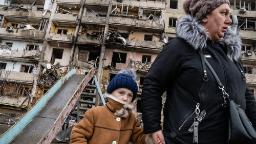
(CNN)It was only a week ago that the major powers and institutions that hold the Western alliance together were triumphant in their unity over Russia’s aggression toward Ukraine.
What a difference a full-scale invasion has made.
On Friday morning, Ukraine’s visibly exasperated President Volodymyr Zelensky said: “This morning, we are defending our country alone,” following Russia’s ground invasion of the capital, Kyiv.
He said that while Russia was hit with sanctions by the most powerful countries in the world, “these are not enough to get these foreign troops off our soil. Only through solidarity and determination can this be achieved.”
According to his tweets, what Zelensky wants is greater military assistance from his allies, including a no-fly zone, and for sanctions to be tightened on Moscow. One of his chief complaints is that Russia was not cut off from SWIFT after the invasion — a high-security messaging network that connects thousands of financial institutions around the world.
Based on the escalation in fighting, Zelensky can reasonably claim that the unified Western response has not had the immediate effect of deterring Vladimir Putin and his regime from invading Ukraine.
Which raises the question of why, in light of a full-scale invasion and after months of preparing for war, has the Western response appeared so underwhelming?
According to a senior European Union diplomat, member states were ultimately divided when it came to the crunch on how hard to hit Russia — especially on the matter of SWIFT.
“There is a group of incrementalists who have been arguing that it should happen step-by-step and that we need to keep something in the tank,” the diplomat said. However, they noted that the holdouts happened to have good economic ties to Russia. They particularly criticized member states who wanted to continue exporting luxury goods to Russia. “It seems to me the incrementalists are looking for ways of not having to swallow the most difficult pill right away.”
So, did the EU simply choke at the last minute? It seems a little more complicated than that. Officials from multiple Western governments told CNN that the sanctions were largely in line with what had been expected and in some cases went further than they’d hoped.
So, did the EU simply choke at the last minute? It seems a little more complicated than that. Officials from multiple Western governments told CNN that the sanctions were largely in line with what had been expected and in some cases went further than they’d hoped.
A NATO diplomat explained that the sad reality is, the Ukraine crisis could almost have been tailor-made to reveal the limitations of NATO and the EU when the actors involved are not members of either.
“People in NATO are not angry with the EU or other allies. The reality is there is no Article 5 option. Sanctions, no matter how extreme, can only go so far when you are dealing with someone like Putin,” the NATO diplomat said.
“People in NATO are not angry with the EU or other allies. The reality is there is no Article 5 option. Sanctions, no matter how extreme, can only go so far when you are dealing with someone like Putin,” the NATO diplomat said.
One EU official agreed, saying that under normal circumstances, a bloc of 27 nations signing off on the hardest sanctions package would be a cause for celebration.
The problem is that most sanctions cannot immediately tank an economy in a way that would stop a war in its tracks. And the situation is just different now that Russia has invaded.
The problem is that most sanctions cannot immediately tank an economy in a way that would stop a war in its tracks. And the situation is just different now that Russia has invaded.
This is the bind Europe finds itself in at the end of a truly dreadful week. It’s easy to say sanctions should be harder or that military options should be on the table, that an imprecise measure of “more” should be done.
The West remains utterly united in the belief that this crisis needs to end as soon as possible.
However, big institutions are ultimately limited by the will of their members and the desire for conflict from their opponents.
And, for now, it feels that this power dynamic is skewed in Russia’s favor.
Add Comment